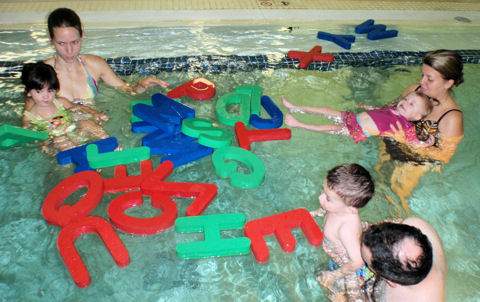
Fun is a valuable tool to use in teaching – whether the subjects are children or adults. It often prevents topics from being mundane and repetitive skill drills monotonous.
Specifically for children, fun – when incorporated into lessons – not only makes the “learning” part less of a “lesson” but correlates what the child is learning to fun.
And that is important when you’re trying to teach a life skill like swimming. This is definitely an activity that you want children to have fun doing so that they continue it forever.
How does this work?
Just think about it for a second. Isn’t it easier to get our tiny tadpoles to immerse their faces in water and blow by making it a game of bubbles? Can we more easily get them to relax moving around in the water by creating a game of trading places with the other children in their lesson circle? You can even make a game of when they are to start and stop when they line up against the wall with red light, green light! Simon Says is a great game for getting even the tiniest student to imitate movements. With older students, pushing off the wall can be a game of launch the rocket ship and floating on the back may even be a game of imitating otters eating their lunch!
One of the most important “rules” for teaching with play is to make sure there is always purpose for the play. Are the games a vehicle for knowledge that will help them to learn? Will the game they are playing sharpen a skill? Will they get a new understanding of how it feels to do activities in the water? It is important to pay attention to this rule. Otherwise the “play” aspect of the lesson is just keeping them busy or distracted so they don’t get bored and stay engaged. And while those may be a couple of the bonus benefits of play in teaching, they are the goal of incorporating fun into lessons.
Our goal is that children who start out having fun with swimming games will become teens and adults who have fun swimming. And that is ageless fun!
Little Otter’s curriculum is proven to incorporate the most meaningful types of play into lessons that greatly enhance swimming lessons from the tiniest to the most mature subjects through instructors and administrators who are experts at swimming and teaching students of all ages.


Conversations